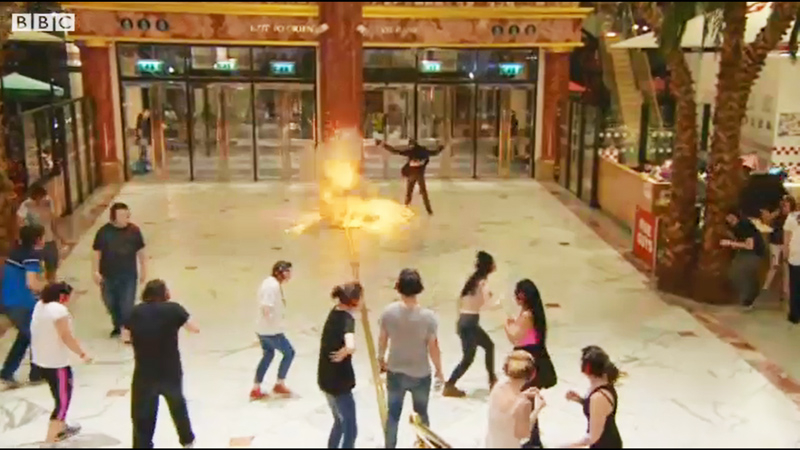Sometimes you can see a whole society’s self-delusion in under a minute. Consider a single minute that occurred in Britain this week.
On Monday night, Greater Manchester Police staged a pre-prepared mock terrorist attack in a Manchester shopping centre in order to test emergency responses capabilities, readiness and response times. At one stage, an actor playing a suicide bomber burst through a doorway in a crowded part of the shopping centre and detonated a fake device.
It turned out that the actor pretending to be a suicide bomber had shouted the words “Allahu Akbar” (“Allah is Greatest”) before the simulated attack. This may have helped make the simulation more realistic, but it had an immediate backlash. Nobody complained about the simulated attacks. What disturbed some people was the simulation of the signature Islamist sign-off.

A video still from the mock terrorist attack staged on May 9, 2016 by the police in Manchester, England. |
Within hours, the simulated moral outrage machine, social media, began deploring the outrageousness of the exercise. Soon, community spokesmen were on the airwaves, deploring the use of the crucial phrase. Assistant Chief Constable Garry Shewan said,
“[O]n reflection, we acknowledge that it was unacceptable to use this religious phrase immediately before the mock suicide bombing, which so vocally linked this exercise with Islam. We recognise and apologise for the offence that this has caused.”
Greater Manchester’s police and crime commissioner, Tony Lloyd, tried to explain that,
“it is frustrating the operation has been marred by the ill-judged, unnecessary and unacceptable decision by organisers to have those playing the parts of terrorists to shout ‘Allahu Akbar’ before setting off their fake bombs. It didn’t add anything to the event, but has the potential to undermine the great community relations we have in Greater Manchester.”
By now, most of the national papers and the 24-hour news programs were all over the story. That is where the revealing minute happened. On Sky News, interviewer Kay Burley was interviewing one Jahangir Mohammed, who was introduced as a “community worker.” Mr. Mohammed spent some time commenting:
“Like everything, there’s a securitised approach to these things and that’s necessary in training like this. But I think sometimes there’s also a need for them to have a bit of religious and cultural context when they’re doing training like this in a wider setting about the possible implications and the effects on wider society and communities within that society.”
Ms. Burley thanked Mr Mohammed for his illuminating contribution and went onto the next news item. In other main stories, she said,
“One man has died, three others injured after a knife attack at a train station near Munich. The attacker — a 27-year-old German — shouted ‘Allahu Akbar’ according to witnesses, before stabbing people at the station in Grafing. He was overpowered at the scene and is now in custody.”
The combination of these two news stories took about one minute.
Whether or not the Grafing attacker turns out to be a non-Muslim with psychiatric issues, as the press is currently suggesting, or an Islamist with or without such issues, this single minute of broadcast footage says so much about the problem that societies such as Britain’s are now in.
On the one hand, the overwhelming cause of our current security problems is Islamist terror. It is the number one cause of concern to our police, intelligence services and everybody else with the nation’s security at heart. The public expects to be protected from such terror and expects that protection to come from that security establishment. Yet all the time, a vocal lobby of Muslim and non-Muslim figures tries to pretend that the threat is not what it is, or that an attempt to depict any and all efforts to protect the country — even one phrase said by one actor in one simulated attack scenario — is some terrible crime of bigotry.
Of course, there would have been no social media backlash and no swift apology from the Greater Manchester Police if the terrorist simulation had involved a “far-right” terrorist. But there is always a backlash if the scenario reflects the real security threat that all our societies are facing. This is yet another occasion in which the general public’s view of people’s priorities is legitimately raised. Why would any Muslim or anyone else genuinely opposed to terror object to the realistic simulation of such an event? One can see, of course, that it may be offensive to somebody’s religion. But if so, what is more offensive to their religion: one actor saying “Allahu Akbar” as part of one simulation, or countless Muslims around the world shouting the same phrase before real attacks in real time?
If I were a Muslim, I would spend every minute of my waking life trying to persuade my co-religionists not to kill people right after shouting about my Allah. I do not think I would bother for a second if a police force, trying to keep people safe, chose realistically to simulate the behaviour of my co-religionists. It is a matter of priorities, and across Britain and many other countries in the world today, our priorities are now seriously awry.
Douglas Murray is a current events analyst and commentator based in London.
























